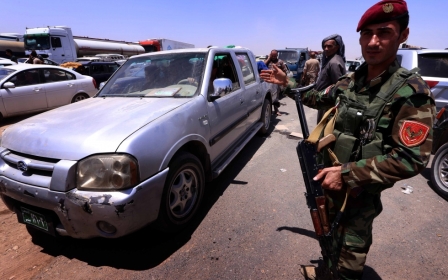'War crimes' and unrest in Iraq and beyond

Iraq’s Defence Ministry on Monday published pictures of air strikes against “armed groups” including ISIL in northern Iraq, in response to the continued militant advance towards the capital Baghdad.
According to Sky News Arabia, the government concentrated its counter-attacks on Monday on Mosul, Samarra and Salah al-Din province.
At a press conference in Baghdad on Monday, the official spokesperson for the armed forces Qassem Ata told reporters that Iraqi forces had killed 200 “ISIL’s” and burned several cars belonging to them in Anbar province.
According to Ata, armed forces also killed 62 “terrorists” in Diyala province as well as 38 in Samarra.
He also told journalists that nine wanted men disguised as women had been arrested, among them an absconder from Tikrit prison.
Meanwhile, militants were able to affirm their control of Tel Afar, a city near the Iraqi-Syrian border, on Sunday night after a day of fierce fighting between government forces and a coalition of ISIL militants and tribal fighters, reports Al Jazeera.
According to the news site, militants were able to seize full control of the city east of Mosul after Iraqi forces withdrew on Saturday night.
However, the army spokesperson denied these reports.
In a press conference broadcast on state television channel Al Iraqia, Qassem Ata told reporters that the Iraqi army had been able to repel “terrorist attacks” in Tel Afar.
On Monday, state and state-aligned media including al-Sumaria news site reported that reinforcements were on their way to Tel Afar.
Meanwhile, an estimated 200,000 people had fled the city by Monday, according to reports in pan-Arab daily al-Hayat.
“War crimes” and “collective punishment” on all sides
The UN’s human rights chief condemned on Monday reports that ISIL had summarily executed hundreds of non-combatant men in Iraq.
Navi Pillay said in a statement that reports of the execution of soldiers or conscripts who had surrendered or been captured had been corroborated, and that the killing, “mostly conducted in various locations around the Tikrit area, almost certainly amounts to war crimes.”
She also confirmed reports broadcast by Iraqi state television of the execution of 13 religious clerics in Mosul who refused to pledge allegiance to militants.
ISIS are claiming to have executed a prominent officer from the Iraqi army in Diyala province.
Photographs surfaced online purporting to show the body of Faruq al-Tamimi, head of the emergency battalion of the Iraqi army.
There were reports on Monday that electricity and water were cut off for all residents of the northern city of Mosul, which lies 70 kilometres to the east of Tal Afar and is currently under militant control.
The move, which hit Mosul and surrounding regions, was part of a strategy of “collective punishment”, a local official told Turkish news agency Anadolu.
According to the official, there were no problems with the functioning of the province’s main electricity station, which was intentionally shut off on Sunday morning by the Iraqi government.
Unverified reports emerged on Twitter of the capture of Ruuf Rashid, the judge who sentenced former dictator Saddam Hussein to death in 2006.
The reports attribute the capture variously to ISIL, tribal forces and unspecified “militants.”
International ripples
The unrest in Iraq continued to ripple far beyond the country’s borders on Monday.
US aircraft carrier George HW Bush arrived in the Persian Gulf, having been transferred there from the Arabian Sea.
In an interview with Yahoo News, US Secretary of State John Kerry hinted that all options are on the table to put a stop to “mass massacres”, including drone strikes and co-operation with Iran.
However, a Pentagon official later clarified Kerry’s comments that pointed to a possible historic rapprochement between the US and Iran, which have had no diplomatic relations for the past 30 years.
US State Department Spokesperson Jen Psaki also later distanced herself from suggestions of military co-ordination with Iran, instead urging Iraq’s eastern neighbour to support Iraq in “reducing the sectarian nature of how [it] is being governed.”
Recriminations continued among regional leaders on Monday, with both Saudi Arabia and Qatar strongly criticising Iraqi Prime Minister Nouri al-Maliki for “sectarian” policies which they said had led to the current unrest.
Meanwhile, the Kurdish role in the crisis took on an international dimension, with President Masoud Barzani meeting the secretary of Iran’s Supreme National Security Council.
Kurdish officials also continued their war of words with Iraq, with a leader of the Kurdish Peshmerge forces accusing the Iraqi army of “treachery”.
Mohammed Sankkawi alleged that Kurdish forces had been subject to mortar attack but had received orders not to respond, during an operation to support Iraqi forces in the northern region of Carmean.
The effects of Iraq’s unrest are not limited to the US and the immediate region.
Police in Spain’s capital Madrid on Monday arrested eight people suspected of involvement in a network recruiting ISIL fighters.
It is alleged that the ring of recruiters was led by Lahcen Ikassriem, a Moroccan national extradited to Spain in 2005 after being held at Guantanamo Bay, according to a statement by Spain’s Interior Ministry.
Spanish authorities have so far launched 12 raids in Madrid, and the investigation remains open.
Stay informed with MEE's newsletters
Sign up to get the latest alerts, insights and analysis, starting with Turkey Unpacked
Middle East Eye delivers independent and unrivalled coverage and analysis of the Middle East, North Africa and beyond. To learn more about republishing this content and the associated fees, please fill out this form. More about MEE can be found here.




